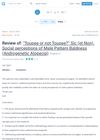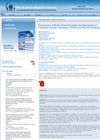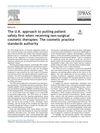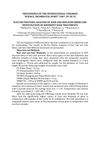3 citations,
June 2022 in “Cells” The conclusion is that the new method makes collecting cells from plucked hair to create stem cells more efficient and less invasive.
 3 citations,
February 2005 in “Lung Cancer”
3 citations,
February 2005 in “Lung Cancer” The new chemotherapy combination for advanced lung cancer showed a 35.7% response rate but caused significant side effects.
 1 citations,
April 2019 in “Journal of Investigative Dermatology”
1 citations,
April 2019 in “Journal of Investigative Dermatology” VB1953 gel significantly reduced acne and resistant bacteria in patients who didn't respond to clindamycin.

Toupees improved perceived attractiveness, especially by older people, but had little effect on perceived self-assurance and health.

The review suggests the study on male pattern baldness needs more detail on sample size, methodology, bias, and ethical considerations.

The review suggests the study on male pattern baldness needs to improve in areas like sample size, methodology, and bias for better quality and credibility.

Wearing a toupee makes men seem more attractive and slightly healthier, but doesn't change how confident they appear.
June 2023 in “Deleted Journal” The document lists research on Pemetrexed and Cisplatin for lung cancer but doesn't give a final conclusion.
 November 2021 in “World Family Medicine Journal /Middle East Journal of Family Medicine”
November 2021 in “World Family Medicine Journal /Middle East Journal of Family Medicine” Women with PCOS are more likely to experience depression and have a negative body image compared to women without PCOS.
 May 2021 in “Journal of the Endocrine Society”
May 2021 in “Journal of the Endocrine Society” A woman's hair loss and other symptoms were due to a rare hormone deficiency treatable with steroids.

Innate lymphoid cells type 1 may contribute to alopecia areata by damaging hair follicles.
65 citations,
October 2015 in “Acta Biomaterialia” The nano-carrier makes etoposide safer and more effective against lung cancer.
 51 citations,
November 2005 in “Journal of Medical Primatology”
51 citations,
November 2005 in “Journal of Medical Primatology” Alopecia in captive rhesus macaques is affected by season, sex, age, housing, and stress, with complex links between stress hormones and hair loss.
23 citations,
September 2020 in “Journal of Dermatological Science” Targeting Vδ1+T-cells may help treat alopecia areata.
12 citations,
December 2020 in “Comprehensive psychoneuroendocrinology” Hormone levels in hair change during pregnancy, with progesterone increasing significantly compared to non-pregnant women.
 11 citations,
October 2019 in “Cancers”
11 citations,
October 2019 in “Cancers” Spironolactone may make some cancer treatments more effective by blocking a protein that helps cancer cells survive.
9 citations,
November 1997 in “British Journal of Dermatology” 5 citations,
March 2020 in “Thoracic Cancer” CT-707 is effective and safe for treating certain Chinese lung cancer patients.
3 citations,
October 2012 in “DOAJ (DOAJ: Directory of Open Access Journals)” Pemetrexed with cisplatin is safer and more effective than gemcitabine with cisplatin for advanced lung cancer.
 1 citations,
December 2021 in “Tropical Journal of Pharmaceutical Research”
1 citations,
December 2021 in “Tropical Journal of Pharmaceutical Research” Kanglaite injection with chemotherapy improves treatment and reduces side effects for advanced lung cancer.
 1 citations,
February 2018 in “Journal of Plastic Reconstructive and Aesthetic Surgery”
1 citations,
February 2018 in “Journal of Plastic Reconstructive and Aesthetic Surgery” The U.K. created the CPSA to set safety standards for non-surgical cosmetic treatments and improve patient protection.
 November 2024 in “Skin Appendage Disorders”
November 2024 in “Skin Appendage Disorders” Telogen effluvium most affects quality of life in alopecia patients.
 September 2024 in “Ain Shams Medical Journal”
September 2024 in “Ain Shams Medical Journal” Androgenic alopecia causes hair thinning, and treatments include minoxidil, finasteride, and light therapy.
 September 2023 in “Fides et Ratio”
September 2023 in “Fides et Ratio” The safety and effectiveness of gender-affirming treatments for children are uncertain, with potential long-term risks like infertility.
September 2019 in “Journal of Investigative Dermatology” Innate lymphoid cells type 1 may contribute to alopecia areata.

Hair properties change under electromagnetic fields and are influenced by individual characteristics and the environment.
 January 2017 in “Faculty Opinions – Post-Publication Peer Review of the Biomedical Literature”
January 2017 in “Faculty Opinions – Post-Publication Peer Review of the Biomedical Literature” 60% of women who didn't respond to 5% minoxidil for hair loss showed significant improvement with a 15% minoxidil solution.
26 citations,
October 1996 in “Journal of Endocrinology/Journal of endocrinology” Goat hair follicles have insulin-like growth factor-I receptors that might affect hair growth, but no melatonin receptors were found.
 21 citations,
January 2012 in “Annals of Dermatology”
21 citations,
January 2012 in “Annals of Dermatology” 17α-Estradiol solution safely improves hair density and thickness in female pattern hair loss.


















